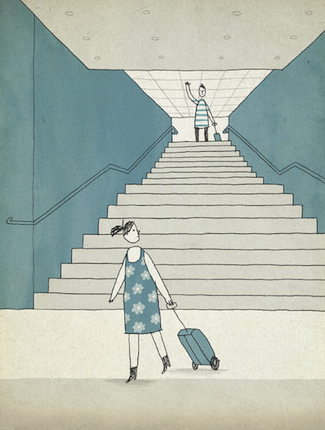Emma Court recently graduated from Cornell University. You can read her entire essay at The New York Times, but we’d love to have your comments here. For more insights into life for Millennials and the astrology they’re working with, check out Eric’s groundbreaking, multi-part Generations: Millennials Reading. — Amanda P.
By Emma Court
When a total stranger kissed me under the artificial lights of an airplane cabin somewhere above international waters, my first thought was of the Orthodox woman sitting to my left.

Illustration by Brian Rea for The New York Times.
I hoped she was asleep. It was a 12-hour flight from Tel Aviv to Newark, and I wanted to nap too, but how could I now?
The kiss, coming out of nowhere, had turned me into the heroine of a bad romance novel: heart fluttering, weak-kneed, every nerve electrified. Those blue fleece blankets had never been so sexy.
It was an overnight flight, and I had already crunched the simple calculus: If I slept, I’d be over the seven-hour time difference by the time we landed and ready to hop back into a new semester at college.
My highest hope for the trip, besides hours of sleep, had been that they would serve hummus at the in-flight dinner.
My stranger and I were returning from Birthright Israel trips with groups from our respective universities. Birthright Israel is a free 10-day trip to Israel for young Jewish-Americans, and I had wanted to go before I graduated. Last winter, before my final semester of college, I finally had.
Because there are so many young people on Birthright Israel trips, they’re often mocked as an attempt to spark a connection to Israel through the bedroom — and plenty of that had happened on my trip. But it hadn’t happened to me until that moment.
Spoiling the perfect narrative of two strangers meeting on an airplane, I admit that we had met before, just once, briefly, when I bumped into a friend from high school during a stop in Jerusalem.
One of her friends had been cute, I had remembered. And now here he was behind me as we boarded the airplane, then bending his tall frame into the aisle seat next to me. As he lifted his backpack into the overhead compartment, I marveled at my luck.
Between us sprang the kind of instant intimacy fostered by open personalities in tight quarters. We spoke in spurts about the gossip on our trips and what we had done during the days spent in Israel. We flirted. We kissed that first time. Then we kissed again.
Splitting a pair of headphones, we listened to the Red Hot Chili Peppers and Taylor Swift. We slept a little, poorly.
Born and raised in New York City, I found his life as a not-so-Jewish boy in North Carolina foreign and dazzling. He and his friends did things like take long hiking trips and, in preparation, dehydrate their food.
I liked how easy he was, how ready to talk. I liked his laugh and his dark eyes. He knew how to figure out where rainbows would appear in the sky and told me about the “Door to Hell” in Turkmenistan, a crater of natural gas that’s been on fire for more than 30 years.
It seemed torn from the back of a Nicholas Sparks paperback: A Southern science major from a small liberal arts school and a Northern humanities major from a huge pre-professional university meet in the skies over the Mediterranean. The heat between them is palpable.
But less romantic details persisted: I was a senior, about to start my second semester, with plans to head to Dallas after graduation. He was a sophomore, with the swaddling comfort of knowing where he’d be for the next few years.
But it didn’t matter anyway, did it? In 12 hours, we’d be back on paths that led us in opposite directions. This meeting was just a romantic interlude from our real lives. And if it did mean anything, we were college students; we knew how to pretend it didn’t.


Yep you nailed it. We are so terrified of being hurt we can only connect in a shallow moment. We practice depth connection in the shallow pond where we walk away quickly so that we never really can be challenged. This is not just a generation x issue it is how we are all becoming.
I agree, I’ve met people in their 60’s and behaving this way…
Meanwhile everyone seems to be opening themselves up to a world full of strangers on social media 24/7, where bullying and ridicule can be rife and where the love-lorn confessions of your teenage heart can be held forever in blackmail pending. Is this because it’s all digital and you can’t actually touch anyone – yet?
It is now over a quarter of a century since the archetypal “rom com” When Harry Met Sally hit the big screen. Whatever anyone may make of the film (script written by Nora Ephron – prior to her Sex and the City days), there were many classic lines and motifs therein. A twelve year on/off dalliance of friendship and separations finally led to a formal love bond. In one of the scenes, involving two teams playing charades, where both characters are dating somebody else, private discussions with a close friend (for both parties), running the rule over the one’s date, are revealing. Sally speaks in praise of her new guy in terms of him being “a grown up” with the implied critique that this is Harry’s downfall. And there is the conundrum. In order to be IN a relationship sustainably, there must be maturity and responsibility. But to GET into one this is something that is much more problematic. Put it down to neuropsychology or whatever, but, getting into relationships requires much more lightheartedness and fun. Maturity is quite unsexy when you are seeking after “magic”, “chemistry” and a sense of “something special”.
So we find that flirtation becomes a safe place to dream. Once any move to ‘reality’ is in view, the fun/ease evaporates and we are left with demanding practicalities. Effectively, the feeling/thinking functions have been radically dichotomised. This means that folk struggle to bridge the gap and are de-skilled. Social media did not create this phenomenon, but as a fabulous catalyst has accelerated it. Sadly, the think/feel split has now entrenched itself in the real/cyber split. In practice, this means virtual communication is becoming a “fantasy hub” and actual/direct communication is increasingly risky. 3D is messy in a way that virtual is not. This locks us further into our bubbles. Nothing ‘bad’ can happen, but nothing ‘good’ either.
This is being habituated everywhere constantly. People make no effort that involves true risk. Once that happens they self-police as self-sabotage. If I feel nothing I may explore, only to discover what I already knew was missing. Several episodes of casual sex later I am feeling just as disconnected as before the contact. We need courage to break out of our bubbles; to halt the reasonings that enumerate all the evidences of why it cannot work out and discover again that the point of it all is not to get a result but to enter into a journey of discovery… Wherever that may lead..
“We need courage to break out of our bubbles; to halt the reasonings that enumerate all the evidences of why it cannot work out and discover again that the point of it all is not to get a result but to enter into a journey of discovery… Wherever that may lead..”
Exactly.
And I also agree that social media did not “create” this split — but it has accelerated it, magnified it, and made it much easier to go along with, as though it’s “for the best.”
Cowboyiam, Leana, Geoff — I think you make great points about how this kind of behavior is becoming more common in older generations, too — despite all that we’re putting out there about ourselves on the Internet. Though I suppose older generations have the (slight) advantage of knowing how it’s different, and therefore knowing what is being missed? There seems to be a bigger chance to choose and act differently when you have a frame of reference that include a different way of being.
Yet the fact that many Millennials writing on this topic seem to understand that something is missing is encouraging. I do wonder how many allow for those observations to penetrate, versus how many tune out and turn back to “behavior as usual.”
Then again, maybe this generation is simply making explicit some of the underlying or unacknowledged trends we’ve all been living, to one degree or another, for a long time?